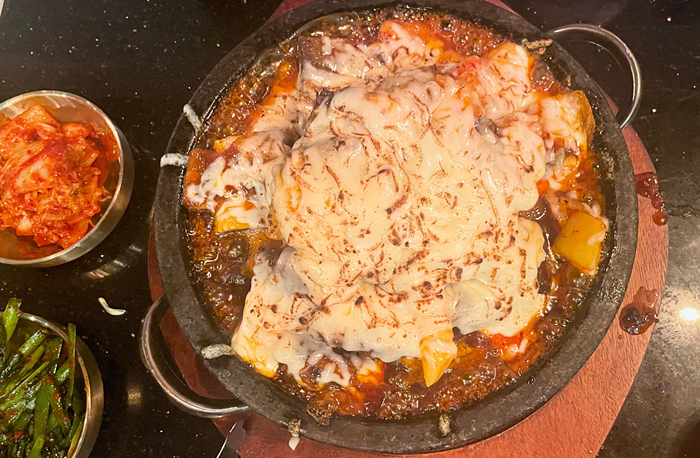When we walked into Porta downtown, where the Greek bistro has moved after its Eastlake location was commandeered for condos, the place was nearly empty. So my friend and I chuckled at each other when the hostess asked if we had reservations. We were sure we were getting a little bit of the old velvet-rope-a-dope—let people think your place is in demand, and make 'em clamor for a spot inside.
We shouldn't have been so cynical. Soon after we were seated the place filled up with tables of six and eight people. Suddenly the room was bubbly, which shouldn't have surprised me. In my past visits to the old location, I'd always gotten the impression that a party was always just ending or just getting started.
My friend filled me in on Porta's history of good timing: Back in the '80s, this location housed the Raison d'Etre, the hippest Mediterranean cafe/cafeteria in town. Now there's a good-looking bar dominating the entryway to let you know that they're not just serving ouzo and retsina here, and a lofty perch of a dining room with a gorgeous wooden-mantled fireplace. Still, Porta seems not quite done, with clunky white tables and chairs against shadowy walls, a big Greek landscape most notable for its width than its charm, and not enough drapery to soften the sound—something we realized when one of the tables lets out an alarming group cackle.
The new menu bravely steps away from Greek-restaurant warhorses, trying instead for a certain clearheaded taverna simplicity. We were particularly impressed with a note from the kitchen saying there will be no Horiatiki (AKA Greek) salad on the menu until decent tomatoes come back into season: It takes a lot of guts for a Greek restaurant to not serve this feta-topped cash crop. The rest of the menu sticks to traditional but less-traveled dishes: The shrimp is served with feta, the souvlaki skewers are made with pork, and the assortment of five dips ($12) boldly refuses to include hummus in favor of fava, a down-home purée of yellow lentils. I like what I see, at least in writing.
The dips arrived chicly on a square, toffee-colored plate rimmed with pita wedges, and the standout among them was an un-baba-like eggplant dip sweetened a bit with roasted red peppers. I was also happy to see hipiti, the Greek take on pimento cheese (with red peppers combined with feta); and tzatziki, the essential cucumber and yogurt dip which at Porta pulsed with a generous pinch of raw winter garlic. But the fava seemed flat—it needed a kick of something acid; and while the mint-feta dip was salty good, it was distractingly garnished with a Manischewitz-like wine syrup—which gave it an odd medicinal taste.
An octopus salad ($8) made me salivate when I read the menu, but when it arrived at the table it looked a little—defeated. Grilled octopus and fingerling potatoes were capped with a droopy toupee of mâche, and tasty bits of olive and mint salsa were too sparse to chase away blandness. The avgolemono ($3), the classic chicken soup bound with lemon and eggs, also tasted rundown and not zippy as it should.
I'd been hoping my Vlahos chicken ($15) would be a variant on the baked, custardy yogurt chicken that I love, but instead it was a sauté of small, untender chicken bits in a thin yogurt sauce redolent of licorice-scented tarragon. We'd ordered the "bandit style" lamb ($18), a house specialty of rosemary-scented lamb baked in parchment, but instead received the apparently less-special braised lamb, naked but for some pita and crumbled feta ($10). I watched as my friend bit into a cube of meat—and sighed. I grabbed a piece and understood—the goal in a braise is succulence, and, like the chicken, this mildly spiced lamb had tensed up in the face of too much heat.
Porta is clearly in touch with the muse of menus, for the document reads simple and true, but it couldn't stave off the mild disappointment of a clumsy meal. Hopefully things will sharpen up before Greek salad makes it back on the menu. ![]()


















